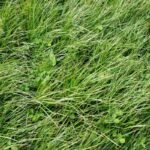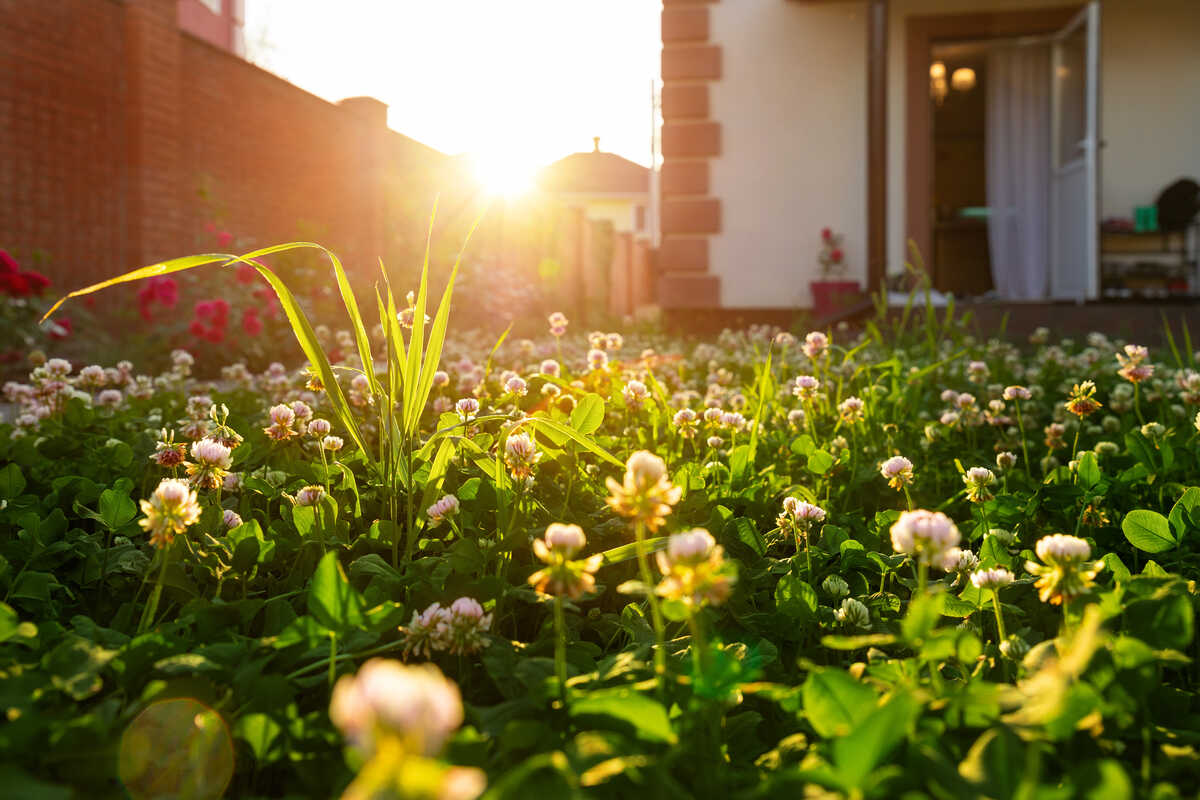
Looking to add a touch of green to your Southern California lawn? A clover lawn might be the answer. Though clover can thrive in SoCal, expect to provide a bit more care to keep it healthy year-round.
The key to a vibrant clover lawn here is understanding the unique needs of your environment. With the right attention, your clover lawn can flourish, providing a beautiful and eco-friendly alternative to traditional grass lawns.
Is Southern California Suitable for Clover Lawns?
Yes, Southern California’s hot, dry summers and mild, wet winters are well-suited for clover lawns. Clover is drought-tolerant and can thrive here with the right care.
However, it’s important to know that clover lawns here require more attention during the establishment phase. Because of Southern California’s climate, clover lawns require more frequent watering and careful monitoring after they’re planted to ensure deep rooting and resilience.
Compared to turfgrass, clover lawns need less maintenance once established. Clover requires less mowing and fertilization, while turfgrass demands more frequent watering, mowing, and fertilization.
Learn more about clover lawns: For more detailed information on whether a clover lawn is right for you, check out this article: “Should You Plant a Clover Lawn in California?”
Best Clover Varieties for Southern California
Choosing the right type of clover is essential for successfully growing a lush and healthy clover lawn in Southern California. Here are the top two varieties that thrive in this region:
White Clover
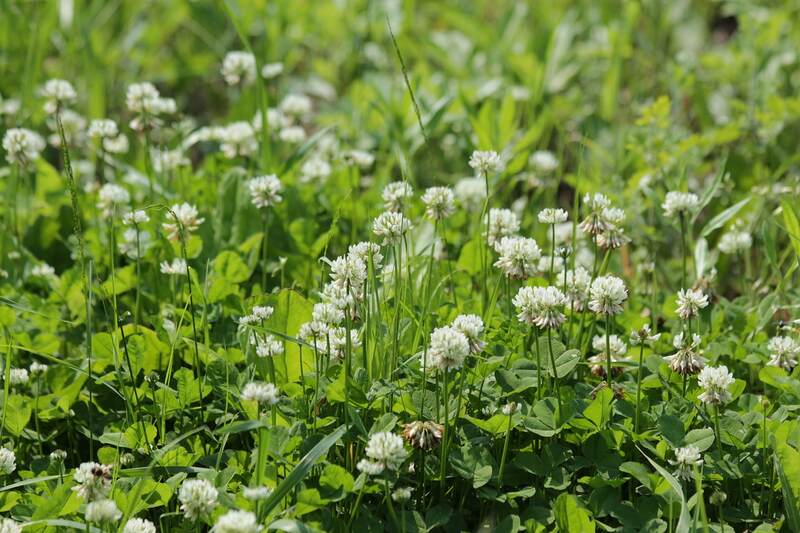
White clover is hardy and low-growing, making it a popular choice for lawns. It can tolerate a range of soil types and conditions, and its ability to fix nitrogen improves soil health.
Microclover
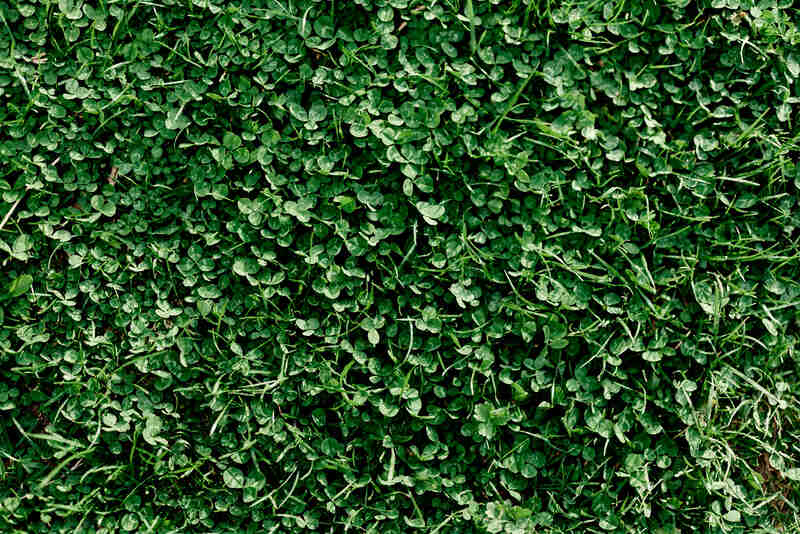
Microclover has smaller leaves and a lower growth habit compared to white clover. It is ideal for those who prefer a more manicured lawn appearance and want to avoid the flowering that attracts bees.
For tips on how to plant a clover lawn, check out our article.
Why Clover Lawns are Ideal for Southern California
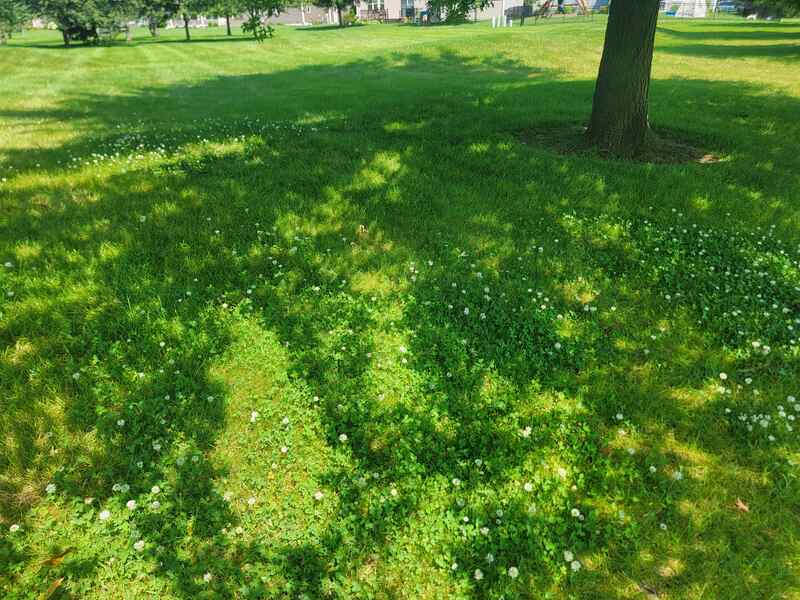
Clover lawns are resilient and offer many benefits, making them a smart choice for homeowners. Here’s why clover lawns are an ideal choice in the region:
1. Water Conservation
Clover requires significantly less water than traditional grass lawns, making it perfect for areas with water restrictions and frequent droughts. Its deep root system helps it access moisture from deeper soil layers, reducing the need for frequent watering.
2. Soil Enrichment
Clover naturally enriches the soil with nitrogen, reducing the need for chemical fertilizers. This not only promotes healthier soil but also benefits surrounding plants, creating a more sustainable and eco-friendly landscape.
3. Low Maintenance
Once established, clover lawns require minimal maintenance and can stay green even during dry spells. Clover’s ability to thrive with less care means you can enjoy a lush lawn with less effort and expense.
4. Aesthetic Appeal
Clover lawns provide a lush, green look with small white or pink flowers, adding natural beauty. Unlike traditional grass, clover stays vibrant during droughts, making it an ideal choice for enhancing outdoor spaces. For more ways to improve your landscape, see: “Southern California Landscape Ideas for Your Yard.”
5. Pest Resistance
Clover is naturally resistant to many common lawn pests, reducing the need for chemical pesticides. This natural pest resistance helps maintain a healthy lawn ecosystem and protects beneficial insects such as pollinators.
6. Weed Suppression
Clover’s competitive growth allows it to outcompete many common weeds, leading to a healthier, more attractive lawn with less need for herbicides.
FAQ About Growing Clover Lawns in Southern California
Does clover attract bees and other pollinators?
Yes, clover is a favorite among bees and other pollinators due to its flowers. If you have allergies or want to minimize bee presence, consider using microclover, which has fewer flowers.
Can clover be integrated with native plants?
Yes, integrating clover with native plants can enhance biodiversity and resilience. Clover provides ground cover and nitrogen fixation, which benefits native species. For ideas, see: “Native Plants for California: Flowers, Succulents, Shrubs, and Trees.”
When is the best time to plant clover?
Plant clover in the spring or late fall. These times have the right temperatures and moisture for clover to grow well.
Can clover withstand foot traffic?
Clover can tolerate moderate foot traffic, but it may not be suitable for areas with heavy use. For high-traffic areas, mixing clover with traditional grass can help maintain lawn integrity. To learn the best grass varieties for Southern California, check out: “Best Types of Grass for California.”
Let the Pros Handle Your Lawn
Clover lawns are a sustainable, low-maintenance choice for homeowners across Southern California. With numerous benefits, it’s no wonder many choose this type of lawn.
If you need help establishing or maintaining a clover lawn, reach out to a local lawn care pro today. They have the expertise and experience to ensure you have the lush clover lawn of your dreams, whether you’re in Los Angeles, San Diego, Long Beach, Anaheim, or Riverside.
Main Photo Credit: Kirill Gorlov / Adobe Stock Free / License


